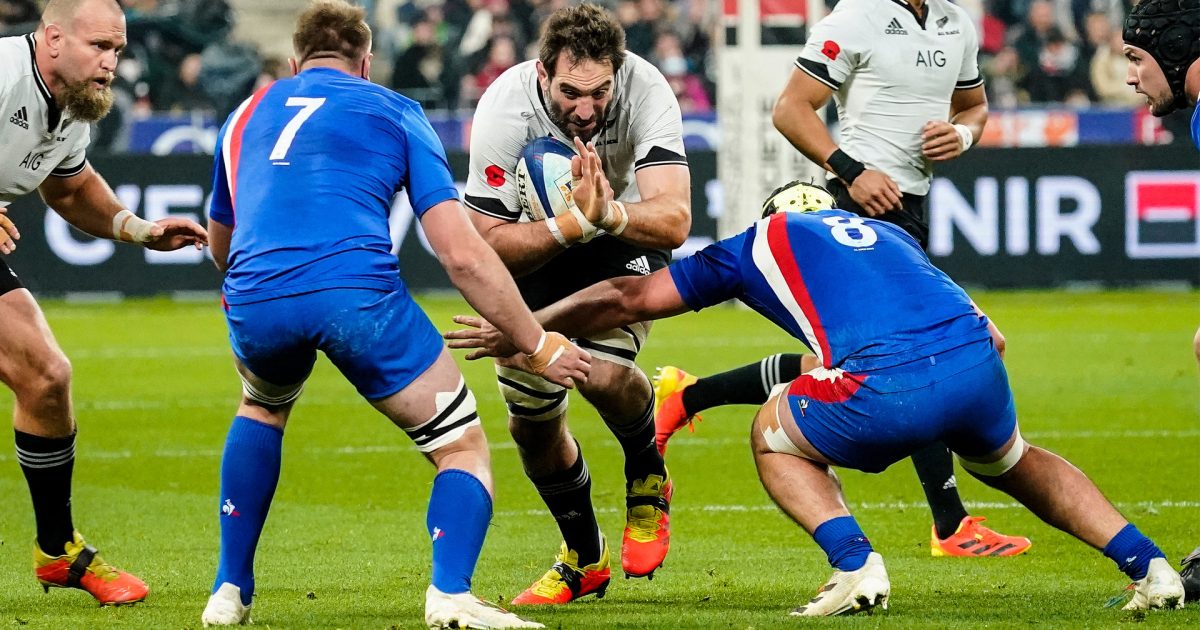Historic defeat not out of the question for All Blacks as blue wave looms large

The All Blacks hold the honour of being the sole side to have never suffered defeat during the pool stages of a Rugby World Cup but if events from the past six months are anything to go by, that could change.
Throughout the nine iterations of the global competition, only once has New Zealand not progressed through to the semi-finals – and that’s thanks to France’s shock victory in Cardiff in 2007. While the likes of England, South Africa and Australia have always competed well at the World Cup, sharing six titles between them, they’ve all been handed defeats during the group stages of the tournament – and England even suffered the ignominy of missing out on the sudden-death matches at their home tournament in 2015 after slipping up against both Australia and Wales.
Such an event is unlikely to unfold for New Zealand at next year’s World Cup in France, of course. The All Blacks boast an impeccable record against teams outside the traditional rugby superpowers and of the nations that were seeded into the third band for the 2023 tournament (i.e. the sides that finished third in their pools at the last competition) – Scotland, Argentina, Fiji and Italy – NZ have tasted defeat on just one occasion. As it so happens, NZ again share a pool with the Azzurri (for the seventh time), who have never really come close to tipping over the men in black.
But while missing out on the quarter-finals is all but out of the question for the All Blacks, there are no guarantees that they’ll escape unbeaten from the pool stages for the 10th time in succession and that’s thanks to the incredible form shown by France coupled with some middling performances from NZ.
France have long been earmarked as an up-and-coming team thanks to their run of successes at the Under 20s World Championship. The Baby Blues finished fourth at the 2017 tournament before taking out the top prize in the two years following.
The top players from those campaigns – the likes of Jean-Baptiste Gros, Demba Bamba, Cameron Woki, Romain Ntamack – are now mainstays in the national squad, linking up with other former age-grade stars such as Julien Marchand, Romain Taofifenua and Antoine Dupont and while it hasn’t all been smooth sailing over the past two-and-a-half years, it’s not been hard to see that Fabien Galthie has been growing something special in La Republique.
While exceptional wins haven’t been hard to come by for Galthie’s men, there have also been some unexpected losses and despite often looking the best team in the various competitions they’ve competed in since the 2019 World Cup, France hadn’t managed to claim any silverware – until now.
A Grand Slam was a fitting reward for a French team that always looked a touch above their opposition throughout this year’s Six Nations championship. While Les Bleus weren’t always exceptional, they did everything needed to get wins on the board and thanks to their victory over the All Blacks in November, they’ve now bested seven of the nine top rugby-playing nations in the world over the past six months – and it would take a brave man to bet against them securing a clean sweep by the end of the year, with matches scheduled against both Australia and South Africa in November.
Which brings us to 2023 – and a home World Cup no doubt played in front of tens of thousands of raucous French fans.
18 months is admittedly a long period of time and a lot could happen between now and September 8, when France and NZ are set to square off in Saint-Dennis. The Springboks were languishing in the doldrums a year-and-a-half out from the last tournament but Rassie Erasmus managed to transform them from also-rans to world champions while their grand final opposition, England, had finished fifth in the prior year’s Six Nations. On the flip side, Wales, Ireland and Scotland – the top three sides in the 2018 Six nations – failed to impress at the 2019 World Cup with Wales lucky to make it past the quarter-finals, Ireland suffering a hefty defeat at that same stage of the tournament by the All Blacks, and Scotland failing to make it out of their pool (with the latter two sides both going down to Japan during their group encounters).
As such, France could capitulate between now and 2023 tournament while the All Blacks could reverse the sliding form from last year that saw them go down to South Africa, Ireland and France in the latter half of the year.
The smart money, however, would be on France continuing to grow into a world-class superpower while it’s difficult to see NZ achieving a complete 180 over the next 18 months, unless there are some big changes in personnel.
The All Blacks will always boast an aura of success thanks to their decades of accomplishments and the mana that surrounds the team but despite what many’s hearts may say, the head should be picking that France will go into the next World Cup as favourites – and that means they’ll likely boast the shorter odds in the opening game of the competition when they do face off with New Zealand.
It was France who handed the All Blacks their first-ever loss at the quarter-final stages of the 2007 Rugby World Cup and it could be Les Bleus who again hand New Zealand an historic defeat in 2023.












































































France will choke